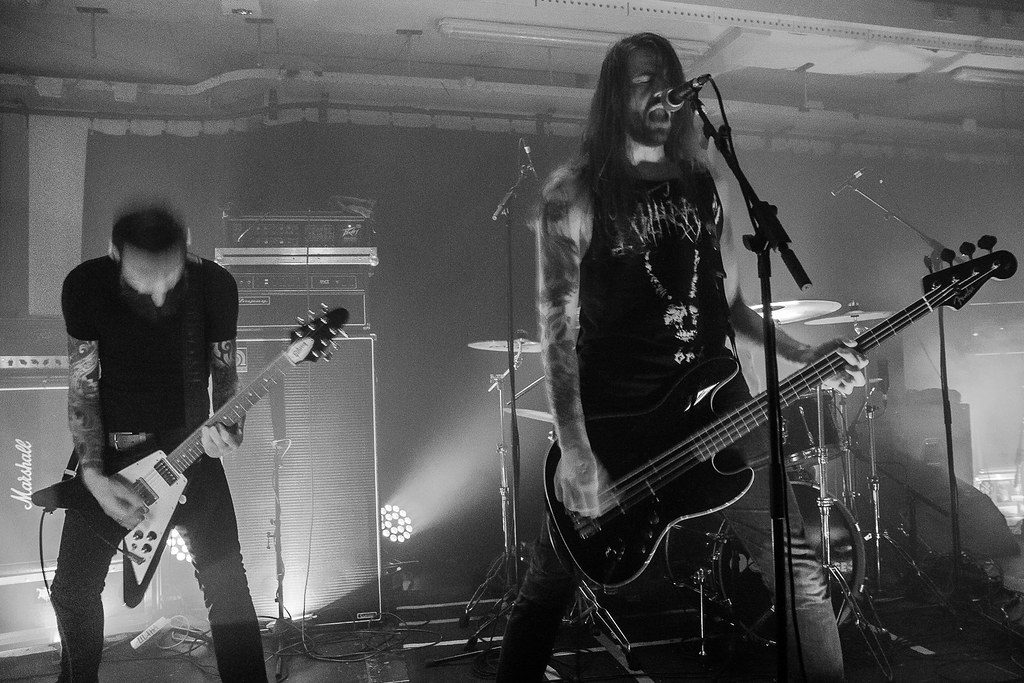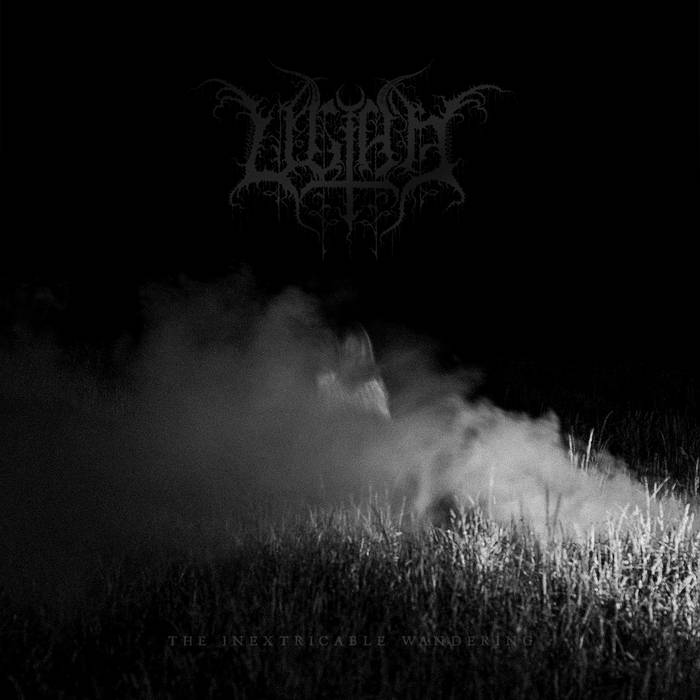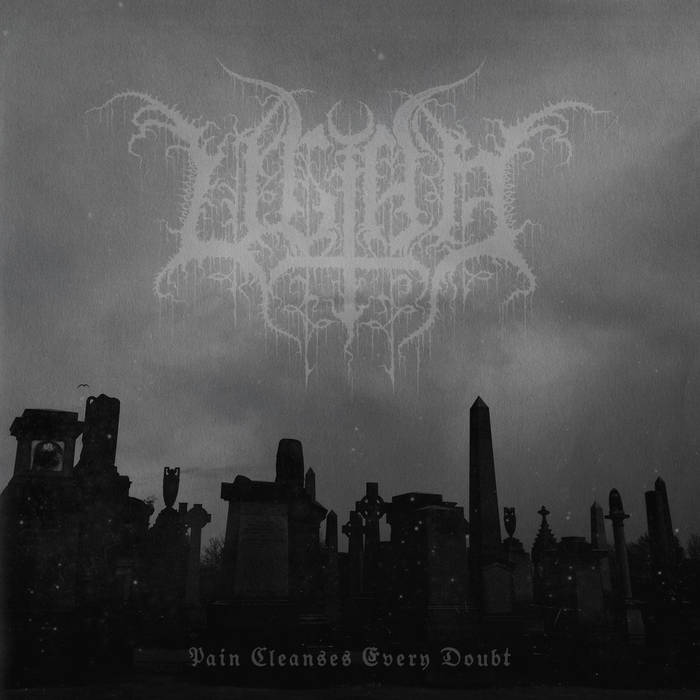October 2018
Check out this atmospheric black metal piece beyond the usual patterns conveying darkest ideas into music!
Strongly recommended to ones who love to delve into melancholia sea surrounded by darkest visions...

Your latest album will be released on
October 5th. You put another dimension into your sound for darkness expands
with clean vocals, more ambient passages, keys that came into prominence and
also doom influences. What do you wanna say about the new album called The
Inextricable Wandering?
Well it’s our third record and
basically came into being since May 2018, including most of the song writing. I
mean some songs have been pretty much set in stone for a while longer (like The
Avarist (Eyes of a Tragedy), but a lot of work on the details was finished just
days prior to the recordings or during the sessions. The circumstances
accompanying the record were difficult to say the least. Personal struggles, a
deadline approaching, people we needed to rely on leaving us out in the rain,
our second guitarist leaving the band - to be honest I think we all had our
doubts intermediately if we could even finish this and still be a functioning band
afterwards. But somehow we managed to get our shit together, and The
Inextricable Wandering became a document of the last few months, especially in
the life of Ralph, who writes the lyrics and the basic structures of the songs.
It ended up being a harsh but melancholic, dark record, that also reflects the
hectic rush we found ourselves in. I think we succeeded to keep most of our
trademark elements (if you want to call it that), but also trying out new
things like the completely snythdriven song “There is No Love, High Up In The
Gallows“.
How was the production? Can you say
that this album is different than other releases of Ultha by new choices as
different studio, engineering on mixing&mastering?
CN: Actually we stuck to our guns: We
recorded TIW at Goblin Sound, which is the recording studio of Andy Rosczyk,
who’s also doing synth/electronics in Ultha. He did the mixing, too. For
mastering purposes we worked once again with Michael Schwabe of Monoposto
Mastering, who also mastered the song on our „Dismal Ruins Pt. II“ EP. Working
with Andy in the studio and Michael Schwabe for mastering is as good,
professional and relaxed as it gets, really.
I am really fascinated and lost
myself in the cycles of ambient passages especially at the song called “There is
No Love, High Up In The Gallows” which is instrumental. Could you please tell
the story of this song? Will you continue composing this kind of songs in your
upcoming albums?
Regarding the flow of TIW it was
pretty clear for us that we needed something different after the first two
songs, which are quite aggressive and metallic. If we’d choose to have another
classic metal song after those, it would have been just too much - after all we
write music we ourselves would want listen too, and for us it’s utterly
important to have a well balanced record at the end of the day. I mean, we’re
not a war metal band so we wanted to have something that lets the album breath,
but still keeping up the oppressive tension.
Ralph basically wrote it at home on
an old Casio keyboard. He’s quite into movie scores of Max Richter, Clint
Mansell etc., and we’re all listening to various forms of synth-driven music,
so for us it wasn’t even such a revolutionary idea to have a track based
completely on electronics. In the studio he and Andy reworked the song and
worked out some more details. The song reflects quite good the feeling everyone
gets from time to time, trying to climb higher and higher, to leave some shit
behind, just to end on top of the hill with a noose around your neck.
Could you please tell about latest
artwork? Who took this photo? What does it express in relation to your music?
We worked with our friends Ivan K.
Maras and Sara Biscaldi of Deathless Pictures. The picture directly relates to
the album title, The Inextricable Wandering: It shows a blurred figure, trying
to find its way through darkness and mist - which in itself of course is a
metaphor for life itself, which more often than not shows no clear contours and
no clear path but darkness and terrible uncertainty, resulting in fear and thus
disappointment and failure.
The founder member and guitars J left
the band in 2016. What was the reason? What changed after his leave at the
band’s side mainly?
Jens unfortunately had to quit the
band due to health and job reasons, it was nothing he or we could have done
something about. It still sucks, but that’s how life is. The main thing this
fact brought us was a seemingly never ending search for a new permanent
guitarist. We’re currently having our friend Lars of Sun Worship filling in on
second guitar until we find someone to take the position as a „proper“ member
again, after our last guitarist had to leave the band as well. The worst part
of Jens leaving surely is that he and Ralph just worked perfectly together when
writing music. It was almost scary how Jens would always come up with something
outstanding in addition to Ralph’s ideas within seconds and the other way
around. The loss of this cooperation left the main songwriting on Ralph’s
shoulders alone, and it’s hard to find someone who’s able to fill this gap AND
also fits into this group of weirdos on an interpersonal level.
Andy Rosczyk has become the full-time
member of Ultha in “electronics” in 2016 as well. How did you take this
decision? Will there be more ambient passages or experimental things in the
future?
 Andy also recorded our debut before
he joined the band, so we already knew that we’ll get along with him greatly.
Also Ralph and Manuel knew him from years ago from mutual shows with their old bands
and what not - after all the scene we come from isn’t that big. Emperor and
Neurosis are huge influences for Ultha, so for us it was a no-brainer to expand
our sonic range by adding electronics and synths. It just offers so many
options it would have been stupid not to do it, especially since Andy is really
into experimenting with different sounds and effects. Nothing’s set in stone so
far, but we’ll surely make full use of our possibilities, as long as it adds
something to the music we can appreciate.
Andy also recorded our debut before
he joined the band, so we already knew that we’ll get along with him greatly.
Also Ralph and Manuel knew him from years ago from mutual shows with their old bands
and what not - after all the scene we come from isn’t that big. Emperor and
Neurosis are huge influences for Ultha, so for us it was a no-brainer to expand
our sonic range by adding electronics and synths. It just offers so many
options it would have been stupid not to do it, especially since Andy is really
into experimenting with different sounds and effects. Nothing’s set in stone so
far, but we’ll surely make full use of our possibilities, as long as it adds
something to the music we can appreciate.
You re-released “Pain Cleanses Every
Doubt“ album by Translation Loss Records for US market on April 29th. How is
the distribution and reactions from US fans?
The reactions we get from the US over
all really positive, I mean since we derive a huge part of our musical DNA from
US bands it’s not that surprising. On the other hand the US has so many great
bands itself, it’s hard if not impossible to put yourself on the map there if
you’re such a small band with very limited over-seas touring possibilities. So
when Translation Loss approached us for a US re-release of PCED, of course we
said yes, especially since there were no strings attached to the deal. But to
be honest, I don’t really know how widespread their distribution is.
The US scene is known with
atmospheric, ambient bands mostly as one-man project while Europe has long
history and many branches of black metal mostly into aggressive, black/death
style lately. How do you see the both scene in terms of black metal and Ultha? What are the differences?
We definitely had names like Xasthur,
Leviathan, Weakling, Ash Borer or Fell Voices in mind when we started this
band, much more than European ones. I mean, of course you can’t play this music
without having references to the Norwegian second wave, and we also dig bands
like Mayhem, Darkthrone or the above-mentioned Emperor, just to name a few. But
I guess it’s quite obvious that our sound is closer related to „Dead As Dreams“
as to „A blaze in the northern sky“, or let’s say something like Behemoth.
On a wider scale the US scene is way smaller and much more rooted in the DIY scenes there than its European counterpart - that also might be a reason why we relate more to US bands, because we come from a comparable background, scene-wise speaking. A Black Metal band like Watain or Marduk just doesn’t exist in the US, speaking of fame and influence. Not that it’s a bad thing, just different.
On a wider scale the US scene is way smaller and much more rooted in the DIY scenes there than its European counterpart - that also might be a reason why we relate more to US bands, because we come from a comparable background, scene-wise speaking. A Black Metal band like Watain or Marduk just doesn’t exist in the US, speaking of fame and influence. Not that it’s a bad thing, just different.
What do you think about new
diversions into black metal comprising noise, darkwave, shoegaze? There are bands
creating very influential music with unconventional styles, images
visually.
It’s great, really. Black Metal can be so annoyingly stubborn and traditionalist, with so many rules about what you’re allowed to do and what not, every band stepping out of these boundaries by trying to incorporate something else is more than appreciated, no matter if I personally like the outcome. Let the scene police do their judgment in its online forums and do whatever feels right to yourself, that’s the only thing that matters when creating music, and especially Black Metal is no exception. Just take a look directly at the early beginning of the second wave, or even just at the catalogue of Deathlike Silence Productions - experimentation with other sounds and styles wasn’t the exception, but the rule! None of these bands sounded like Bathory or Celtic Frost, but took the basic ingredients and transformed them into something extremely unique. This mindset is something the current scene totally lacks for a huge part. Just put on corpse paint, don’t play live but perform „rituals“ (meaning you but a trash bag full of candles and chicken bones on stage) and you’re set - that’s just a charade if you can’t come up with even one decent song.
You have a split with French
atmospheric black metal band Paramnesia. How did you come together?
Ralph knew the guys Paramnesia
personally even before Ultha started. Since we all come from the same scene
(Paramnesia come from Strasbourg, which is near the French-German-border) we
quickly ended up playing shows together, I think one of the first five shows
was already with Paramnesia. We all dig what they do and the other way around
and their drummer Pierre, who is a very successful tattoo artist with Business
For Satan, also did a shirt design for us at one point. So someday, I think
after we played their hometown, the idea came up and after a few delays we made
it happen. We wouldn’t do split records with just any band we don’t have a
relation to. Until now, when we did it, the other bands were always our friends
not just on a purely band-wise, but also personal level. Everything else just
doesn’t make any sense to us.
You have been composing long songs
almost reaching 20min like “The Seventh Sorrow”. What is the difference between
standard song and the longer one while composing? Is it like short stories and
a novel? How does the writing process work for Ultha?
I can’t really tell you the
difference, because I don’t really know it any other way. I mean even our
shorter songs are around the 10 minute mark. Ralph writes all the basic riffs
and structures, and we usually work with these in the rehearsal room, change
things, repeat things, add layers, remove parts and so forth, until we’re all
satisfied with playing the songs. If something doesn’t feel right while playing
it or simply bores us, we rework it. It’s important to us to maintain a certain
flow and feeling throughout a song and a record, to have a balance between
tension and release and to keep the atmosphere perceptible all the time.
What kind of themes did you use on
the lyrics of the latest album? There are stunning, eerie song titles like
“With Knives to the Throat and Hell in Your Heart”, “There Is No Love, High Up
in the Gallows” that I found death in details and also sound like a bit Lovecraftian
horror coming from deep inside in full isolation, misanthropic and surrounded
by unspeakable fears.
Ralph wrote “The Inextricable
Wandering” as a concept record about fear and how it relates to disappointment
as a consequence. Every song deals with a certain kind of fear he felt or
encountered. It’s interesting you mention Lovecraft, since his way of
describing fear as something lurking, threatening yet vague without directly
confronting the reader with it’s actual reason at first, is a huge influence on
us when it comes to creating this certain atmosphere in our songs. Ralph and I
are huge fans of Lovecraft’s work.
Your name Ultha is coming from a
Lovecraftian town and deity Ulthar, right?
That is correct, yes. We dropped the
R at the end for reasons of symmetry in our logo and because there have been
various bands of the same moniker around, but Lovecraft is where it comes
from.
German authors who had been delved
into darkness all their lives like Hölderlin, Novalis...melancholy seems like
part of their existence. Ultha is like summoning the devil called melancholy
living inside with its music. It seems that it has certain touch into your
music. How do you define melancholy for you and for your music?
You’re dead-on with your thoughts. I
dare to say, creating this music, and especially in Ralph’s case, writing it,
wouldn’t be possible without melancholy in your heart. We could play music
without it, but it wouldn’t sound like Ultha. It’s nice that you can hear you
what we tried to express in our music. Lots of people say it’s depressive, but
melancholic is much more apt, since melancholy feeds much more of nostalgia,
everyday’s disappointments, loss and the fear there of. Whereas depression is a psychological state whose origins more
often trace back to certain events or experiences in the past. The lines
between are blurred of course, but melancholic is what we’d call our music, not
depressive. In that sense we’re much more a Gothic band than a DSBM band.
"Like all other music, it
breathed passion and pathos, and emotions high or tender, in a tongue native to
the human heart, wherever educated."
-- Nathaniel Hawthorne, The Scarlet
Letter, 1850
Do you think if art is related with
pathos, weltschmerz or the opposite nephente? Could you please tell me about
your point of view on creating your art.?
It often is. I can barely think of any art I perceive that isn’t rooted in weltschmerz in one way or another. Art is emotional expression, thus always driven by what affects you. If I wouldn’t feel the way I do about the world, its human inhabitants and their failures, I wouldn’t scream these lyrics, wouldn’t play this music. You know, authenticity is probably what is most important to us as a band, so if I would think art is decoupled from fundamental emotions of the author, I couldn’t do this. Or even, wouldn’t need to.
Do you have literary influences or
authors you follow?
I can only speak for myself here of
course, but when it comes to literature I see reflected in Ultha in way or
another, I think of Sylvia Plath, Paul Auster, also classical German stuff like
Goethe, Schiller, besides Poe and Lovecraft. But that’s really just what comes
to my mind first, Ralph can surely give you some more insight to what
influences his writing.
 |
| Photo by Francis Bijl |
There are song with the themes of
love, loss especially at the Converging the Sins album. Love has intense dark
side that human beings refuse to see which can turn to a dark art. Love,
passion and the fire it holds inside, what do you wanna say about?
Wow, I could probably write an essay
about this… to keep it brief: Love, and especially the negative aspects of it
and what they cause, is probably the most important fuel for many, many
artists, no matter their way of expression. And Ultha is surely no exception,
just the contrary. We express what moves and touches us, and like for most
human beings, love is THE dominating factor in our lives.
Black metal comprises many branches
and many ideas. From 80s to today it changes a lot but anyway there are certain
distinctions. From satanic philosophy which has different approaches itself to
NSBM or more into dark arts surrounded by topics like death, melancholy,
despair, and solitude. Where do you see Ultha for the philosophical side of
Black Metal?
Like mentioned above, some people tried
to put us into „Depressive Suicidal Black Metal“ drawer, but luckily enough
people realized that this is not what we’re trying to do. To be honest, I don’t
even think if we’re a Black Metal band at all. I mean, yes we have a lot of
musical references to Black Metal, the tremolo picking, the blast beats, the
screaming, but then again we have a lot influences from other genres as well.
And we also don’t follow a certain philosophy or idea you mentioned as a band.
Maybe the closest thing to that would be that we think that „You exist for
nothing“ (which is also a song on our debut record), meaning that no matter
what you try to achieve, to do, to win, at the end you’re gonna die just like
everybody else, and will be gone for good. But we don’t waste our time by
fulfilling someones expectations. We’re a metal band and it’s not our raison
d’être to pinpoint philosophies and political ideas.
Do you have influencers from other
genres, music styles?
Yes, lots of. Different styles of
Metal influenced us as much as totally different genres. From classical music
to Darkwave and Post Punk, electronic music, Punk, Neo Folk - the list is
probably neverending. We all listen to a very wide variety of music and I hope
it reflects in our music. You’ll hardly find a genre of rock or pop music
someone of Ultha hasn’t touched in his life.
How are Ultha shows? How do you
perform this intense music on stage?
We keep it pretty basic, no altars,
no candles, so masks, no special performances or rituals. We do use fog and
static red light, that’s it. The idea is to step back as individuals and let
the music do the talking, no gimmicks needed. We do move quite a bit on stage,
because the cathartic element in playing live is one of the most important
things for me personally and also the others, I really need this to get my head
clear and shit from my mind.
What do you think about black metal
in Germany? Can you give a few names of bands worth to mention?
There are some good bands for sure,
but in all honesty, I don’t think we’re really a part of the Black Metal scene
here. I think we’re just too different, in sound and content, and also a lot of
people don’t appreciate that we maintain some basic moral standards. But
whatever, bands worth mentioning, of course the classic ones: Katharsis,
Nagelfar, Lunar Aurora, Bethlehem, to drop just a few names. But I think
everyone interested in Black Metal should have heard of these bands anyway.
When it comes to contemporary stuff, everybody showing the slightest interest
in the genre should check out Sun Worship, UNRU, Antlers, Abkehr and also
(Dolch) and Morast, although the latter two wouldn’t classify as Black Metal
per textbook definition.
What are your influential black metal
bands for all times?
My personal top 5: Weakling,
Leviathan, Mayhem, Ash Borer and Ulver when they were still a Black Metal band.
What other plans does Ultha have?
We’re about to start to play shows
again as we speak, going on tour in October and April, play some more shows in
between and hopefully play some festivals in summer 2019. We also have some
ideas flying around for our next release, but that’s not really set in stone
yet.
Thank you for the interview. Please
say your last words…
Thank you for having us. It sounds a
bit stale, but we really appreciate everybody who invests his time and thoughts
in one way or the other in this band.
"This whole life is built on skeletons"
Ultha
Ultha



No comments:
Post a Comment
Note: Only a member of this blog may post a comment.